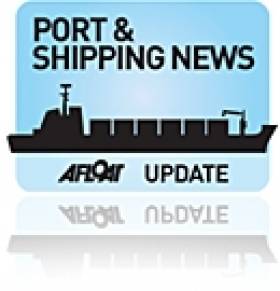Displaying items by tag: Abis Dublin
Brand New Cargoship Makes Maiden ‘Irish’ Call to Namesake Port
#NEWBUILD VOYAGE- As previously reported on Afloat.ie Abis Dublin, a brand new multi-purpose heavy-cargoship made her maiden 'Irish' port of call to her namesake port yesterday, writes Jehan Ashmore.
The D-class 6,000 tonne newbuild had docked in Dublin Port having spent the previous night at anchor in Dublin Bay. On board the Dutch built vessel, operated by Abis Shipping, wind-turbine components could be seen at the aft end of the ship, noting her superstructure is located well forward close to the bow.
Abis Dublin was delivered earlier this month from shipbuilder's in Harlingen, where her owners are based and where the vessel is registered. Her first actual commercial sailing took place earlier this month, between Vlissingen to Emden, with an inaugural cargo of windmill components, which were later unloaded on arrival in Rouen. From the River Seine she then departed bound for Dublin, where the vessel is berthed alongside Ocean Pier.
Her sister Abis Dover, the leadship of the new class series made a call with B-class Abis Belfast last month, again to discharge windmill components. The latter vessel made a further call to the capital port just before Christmas, such activity reflecting the expanding Irish renewables energy sector.
Dutch Shipping Company Seek Professionals and Trainees
#CAREERS AT SEA - The two multi-purpose heavy cargoships that last month discharged windmill components in Dublin Port, are owned by Dutch based Abis Shipping who are currently offering traineeship opportunities, writes Jehan Ashmore.
The pair had met together in the port the same morning, where the newer and larger D-class Abis Dover arrived first followed by the smaller B-class Abis Belfast. As previously reported, they belong to a 14-strong fleet managed in Harlingen, where a local shipyard is to complete newbuild Abis Dublin with a delivery scheduled for this month.
With an expanding fleet of newbuilds, the progressive company which only formed in 2007 is seeking to grow with professionals in training or to those just finished studying. They, regularly have traineeship vacancies run through a nautical support department so to meet demands of charterers. Vacancies currently available are for Captain (D.P.O.), Chief Engineer and Chief Officers (D.P.O.). For further details visit this LINK.

























































